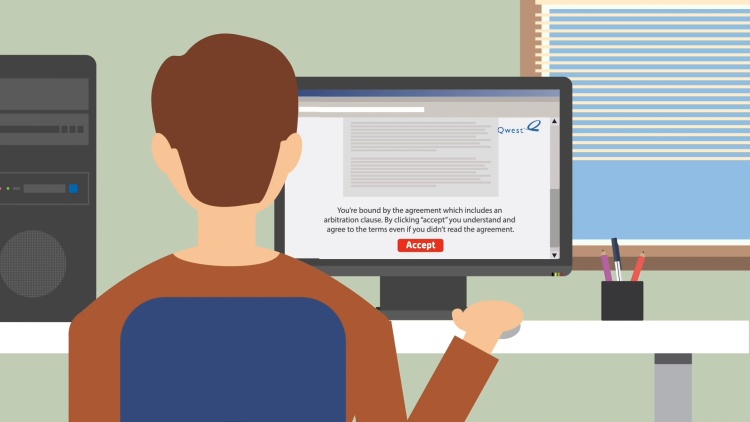Vernon v. Qwest Communications International, Inc.
United States District Court for the District of Colorado
925 F. Supp. 2d 1185 (2013)
- Written by Jamie Milne, JD
Facts
Internet provider Qwest Communications International, Inc. (Qwest) (defendant) offered subscribers a discounted rate if they signed a two-year contract. If they canceled service within two years, they were subject to a $200 cancellation fee. The terms of service were stated in a subscriber agreement that (1) relegated disputes to arbitration or small-claims court, (2) waived the right to pursue any claims as a class, and (3) required subscribers to pay up to $125 in arbitrator fees. Subscribers were notified about the agreement multiple times while subscribing. First, if subscribing by phone, a voice recording referenced the agreement and provided the web address to access it. Alternatively, if subscribing online, subscribers were notified of the agreement and clicked a box indicating assent. Second, all subscribers received an installation disc that again referenced the agreement and where to find it. It also expressly warned that the agreement contained an arbitration clause and limited Qwest’s liability. Third, subscribers received a welcome letter that referenced the agreement and warned of the arbitration and liability limitations. Robin Vernon and three other subscribers (the subscribers) (plaintiffs) canceled their plans within two years and were charged the cancellation fee. They filed a class-action suit against Qwest in federal court alleging that the fee was invalid. Qwest moved to compel arbitration. A magistrate judge granted Qwest’s motion. The subscribers objected, arguing, among other things, that the arbitration agreement was unconscionable and therefore unenforceable.
Rule of Law
Issue
Holding and Reasoning (Jackson, J.)
What to do next…
Here's why 911,000 law students have relied on our case briefs:
- Written by law professors and practitioners, not other law students. 47,100 briefs, keyed to 997 casebooks. Top-notch customer support.
- The right amount of information, includes the facts, issues, rule of law, holding and reasoning, and any concurrences and dissents.
- Access in your classes, works on your mobile and tablet. Massive library of related video lessons and high quality multiple-choice questions.
- Easy to use, uniform format for every case brief. Written in plain English, not in legalese. Our briefs summarize and simplify; they don’t just repeat the court’s language.





